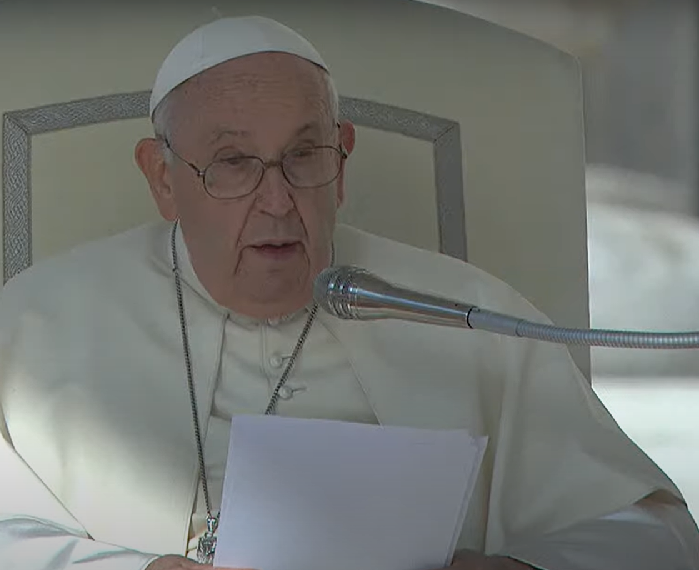Pope calls for immediate release of Israeli hostages, concern over total siege of Gaza
New appeal by Francis to Israelis and Palestinians at the general audience: "I pray for the families who have seen a day of celebration turned into a day of mourning. It is the right of those who are attacked to defend themselves, but also in Gaza there are many innocent victims. The Middle East does not need war but peace built on justice, dialogue and fraternity". "Let the earthquake-stricken Afghanistan be helped". In the catechesis the example of St Josephine Bakhita the former slave whom forgiveness made "a woman of peace and peacemaker".
Vatican City (AsiaNews) - An appeal for the immediate release of the dozens of Israeli hostages held by Hamas. But also deep concern for the total siege in which the Palestinians of Gaza live. And the horizon of a peace "built on justice, dialogue and the courage of brotherhood" as the only solution.
This morning Pope Francis returned to talk about the war between Hamas and Israel and its heavy burden of victims at the end of the general audience held in St. Peter's Square in front of the faithful.
“I continue to follow with pain and apprehension what is happening in Israel and Palestine. Many people killed and others injured. I pray for those families who have seen a day of celebration transformed into a day of mourning. I demand that the hostages be released immediately."
He added: "It is the right of those who are attacked to defend themselves but I am very worried about the total siege in which the Palestinians live in Gaza, where there have also been many innocent victims. Terrorism and extremism do not help to reach a solution to the conflict between Israelis and Palestinians, but fuel hatred, violence and revenge and only make both suffer. The Middle East does not need war but peace, a peace built on justice, dialogue and the courage of brotherhood."
Yesterday afternoon Fr. Gabriel Romanelli, parish priest of the Latin parish of the Holy Family in Gaza, had announced a phone call from Francis to the small Catholic community of the Strip, once again on the front line in this conflict. While today - urging the prayer of the Rosary for peace - the pontiff invited everyone not to forget the tormented Ukraine even in the face of these new dramatic news of death.
At the general audience he also wanted to address a special thought to the population of Afghanistan hit in recent hours by a devastating earthquake which has caused thousands of deaths. “I invite all people of good will to help this people who are already so tried – said Francis – by contributing in a spirit of brotherhood to alleviate the suffering of the people and to support the necessary reconstruction”.
In his catechesis - continuing the cycle of reflections on the passion for evangelization - the pontiff focused attention on the figure of Saint Josephine Bakhita (1869-1947), the former slave from the Sudanese region of Darfur who was then freed and became a religious, “witness to the transforming power of Christ's forgiveness”.
“The physical and moral suffering of which she was a victim as a child left her without an identity" – the Pope recalled.
"She suffered cruelty and violence: she bore more than a hundred scars on her body. But she herself testified: 'As a slave I never despaired, because I felt a mysterious force that supported me'. What is the secret of Santa Bakhita?" - Francis asked himself.
"We know that often the injured person hurts her in turn; the oppressed easily becomes an oppressor. Instead, the vocation of the oppressed is to liberate themselves and their oppressors by becoming restorers of humanity. Only in the weakness of the oppressed can the strength of God's love that liberates both be revealed."
“Forgiveness made her free. The forgiveness first received through the merciful love of God, and then the forgiveness given made her a free, joyful woman, capable of loving. It is therefore a personal liberation from the oppressor that is within oneself and that does not allow one to live, to savor the joy of simple and everyday gestures, of attention to others, of humble service and sincere relationships. Thus Bakhita was able to experience service not as slavery, but as an expression of free self-giving. This is very important: she was forcibly made a servant and then freely chose to become a servant, to carry the burdens of others on her shoulders. During the dramatic periods of the two world wars, she brought comfort and hope to the people of Schio, in Veneto."
"Forgiveness - he concluded - made her peaceful and peacemaker, a free and liberating woman. Her life is truly a miracle of God."







.png)










